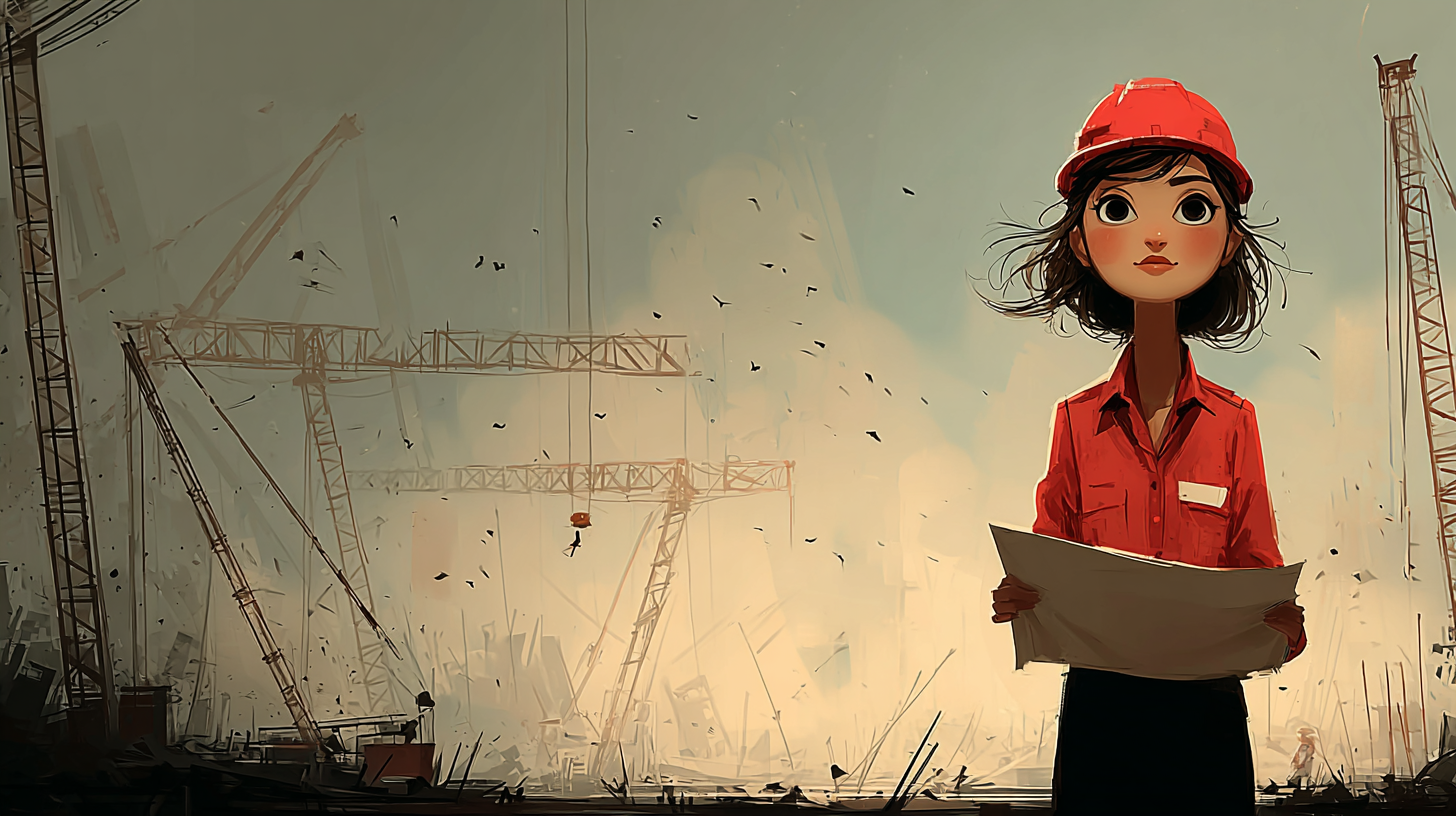“Steel” means very hard metal, and it can also mean to make your mind strong.
“steel” は「とてもかたい鉄のようなもの」で、心を強くすることも表せます。
以下は英単語 “steel” に関するストーリー型学習コンテンツです。まずは大枠の意味を理解して最後の文章で確認しましょう。
主な意味(main meaning)
| 品詞 | 意味 | 発音記号 | 例文 |
|---|---|---|---|
| 名詞 | 鋼(はがね)、鉄鋼 | /stiːl/ | The building is made of strong steel. |
| 動詞 | 気持ちを固める、覚悟を決める | /stiːl/ | She steeled herself for the bad news. |
| 形容詞 | 鋼のように硬い、冷たい | /stiːl/ | He gave her a steel gaze. |
語源(etymology)
“Steel” は古英語 stēle に由来し、さらにゲルマン語系の語 stahliją(硬くするもの)に遡ります。基本のイメージは「とても硬く、強いもの」です。
類義語(synonyms)
| 類義語 | 例文 |
|---|---|
| iron | This gate is made of iron. |
| metal | The box is full of scrap metal. |
| resolve | She showed great resolve in facing the challenge. |
| determination | His determination helped him win the race. |
| firmness | Her voice had a tone of firmness. |
反義語(antonyms)
| 反義語 | 例文 |
|---|---|
| weakness | His weakness was obvious during the test. |
| softness | The blanket’s softness made it cozy. |
コロケーション(collocations)
| コロケーション | 例文 |
|---|---|
| steel structure | The steel structure supports the entire bridge. |
| stainless steel | We use stainless steel pans for cooking. |
| steel industry | The steel industry is important in this region. |
| steel nerves | You need steel nerves to fly a plane. |
| steel door | The vault had a thick steel door. |
2項表現(binomials)
| 表現 | 例文 |
|---|---|
| steel and concrete | The building is made of steel and concrete. |
| strength and steel | His personality is full of strength and steel. |
英語ストーリー(english story)
Title: “Steel Nerves in the Workplace”
Mika had just started working at a construction company. It was her first job after college, and she was both excited and nervous. Her first assignment was to help design a steel structure for a new bridge. Mika had studied engineering, but real-life work felt different.
Her boss, Mr. Tanaka, was known for his firmness and high expectations. On her second day, he asked her to present her ideas to the team. Mika could feel her heart racing. She had to steel herself before walking into the meeting room.
“I believe this design, using stainless steel, will be both strong and cost-effective,” she explained. Everyone listened carefully. Mr. Tanaka nodded.
After the meeting, a senior engineer approached her. “That was impressive,” he said. “You’ve got steel nerves for someone new.”
Mika smiled. She had doubted herself, but now she felt more confident.
Weeks passed, and Mika continued to grow. She learned more about the steel industry and how different metals behaved in construction. She also worked on projects involving steel and concrete, gaining hands-on experience.
One day, during a site visit, she saw a large crane lifting a heavy steel door into place. It reminded her of how much she had changed. From a nervous beginner to someone with strength and steel in her voice and actions.
和訳
タイトル:「職場での鋼のような心」
ミカは建設会社で働き始めたばかりだった。大学を出て初めての仕事で、わくわくしていたが緊張もしていた。最初の仕事は、新しい橋の**steel structure(鋼構造)**の設計を手伝うことだった。ミカは工学を勉強していたが、実際の仕事は違って感じた。
上司の田中さんは、**firmness(厳しさ)と高い期待で知られていた。2日目、彼はチームの前で自分のアイデアを発表するようミカに頼んだ。ミカの心臓はドキドキしていた。会議室に入る前に、自分をsteel(気持ちを固める)**した。
「この**stainless steel(ステンレス鋼)**を使った設計なら、強くてコストも抑えられます」とミカは説明した。皆が真剣に聞いていた。田中さんもうなずいた。
会議の後、先輩の技術者が近づいてきた。「すごかったよ」と彼は言った。「新人とは思えない**steel nerves(鋼のような神経)**だね。」
ミカはほほ笑んだ。自信がなかった自分が、少し強くなれた気がした。
数週間が経ち、ミカは成長を続けた。**steel industry(鉄鋼業界)**について学び、さまざまな金属が建設でどう使われるか理解した。**steel and concrete(鉄とコンクリート)**を使ったプロジェクトでも経験を積んだ。
ある日、現場を訪れたとき、大きなクレーンが重い**steel door(鉄のドア)を吊り上げているのを見た。それを見て、彼女は自分がどれほど変わったかを感じた。緊張していた新人から、声と行動にstrength and steel(強さと鋼のような心)**を持つ人へと成長していた。
Q&A
「steel」と「iron」の違いは何ですか?
「iron(鉄)」は自然界にある基本的な金属で、そのままだと少しもろいことがあります。一方、「steel(鋼)」は鉄に炭素などを加えて強くしたもので、建築や機械などに多く使われます。つまり、steelはironを強化したものです。
「steel」と「metal」の違いは何ですか?
「metal(金属)」は広い意味を持ち、鉄・銅・金・アルミニウムなどすべての金属を指します。「steel」はその中の一種です。つまり、steelはmetalの中の一つで、特定の性質を持つ金属合金です。
「steel」と「resolve」の違いは何ですか?
「resolve(決意)」は内面的な意思の強さを指します。「steel」は動詞として使うとき、何か困難に備えて気持ちを強くする行動を表します。たとえば、「I resolved to study more.」は「もっと勉強しようと決意した」ですが、「I steeled myself to hear the news.」は「ニュースを聞くために心を固めた」です。
「steel」と「determination」の違いは何ですか?
「determination(決意・粘り強さ)」は、長期的に努力を続ける姿勢を表します。「steel」は、一時的な強い覚悟を表すことが多く、特定の困難に立ち向かう場面で使われます。
「steel」と「firmness」の違いは何ですか?
「firmness(堅さ・断固とした態度)」は、感情や意見などが揺るがない状態を表します。「steel」は名詞では物理的な硬さを、動詞では自分を強くする動きを意味するため、ニュアンスに違いがあります。
「steel」と「steel structure」の違いは何ですか?
「steel」は素材そのもの、「steel structure(鋼構造)」はsteelでできた建物や橋の骨組みなどの構造物を意味します。つまり、「steel structure」は「steel」を使って作ったものです。
「steel」と「stainless steel」の違いは何ですか?
「stainless steel(ステンレス鋼)」は、さびにくいように加工されたsteelです。水や空気に強く、キッチン用品などによく使われます。
「steel」と「steel industry」の違いは何ですか?
「steel industry(鉄鋼業)」は、「steel」を作ったり加工したりする産業全体を指します。「steel」は素材そのもの、「steel industry」はその素材を生産・供給する業界のことです。
「steel」と「steel nerves」の違いは何ですか?
「steel nerves(鋼のような神経)」は比喩的な表現で、緊張や恐怖に動じない強い心を意味します。「steel」はここでは比喩として使われており、実際の金属のことではありません。
「steel」と「steel door」の違いは何ですか?
「steel」は素材、「steel door(鋼鉄のドア)」はその素材を使って作られた製品です。強くて壊れにくいドアとして使われることが多いです。
「steel」と「steel and concrete」の違いは何ですか?
「steel and concrete(鋼とコンクリート)」は、建築に使われる代表的な素材の組み合わせで、建物の強度を高めるために一緒に使われます。「steel」単体では強度は高いが、コンクリートと組み合わせることでさらに安定した構造が可能になります。
「steel」と「strength and steel」の違いは何ですか?
「strength and steel」は、比喩的に使われる表現で、「強さと鋼のような心」を表します。特に人の性格や態度を表すときに使われ、「steel」単体では物質的・精神的な硬さを意味しますが、組み合わせることでより詩的・印象的な意味になります。



コメント